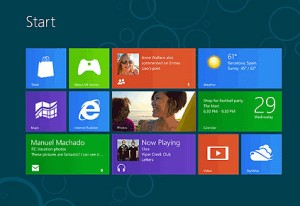Windows 8: the biggest shift in computing since the Mac and the GUI?
 I have already expressed my enthusiasm for Windows 8 a couple of times, but not until the Consumer Preview that was released a few weeks ago did I truly understand how important this next version of Microsoft’s OS is going to be for the computer industry.
I have already expressed my enthusiasm for Windows 8 a couple of times, but not until the Consumer Preview that was released a few weeks ago did I truly understand how important this next version of Microsoft’s OS is going to be for the computer industry.
It’s all in the iPad
Let’s be clear: Windows 8 is absolutely and completely a result of Apple’s iOS and iPad “revolutions”. They showed us that traditional PCs are unnecessarily complex for the common man. With the iPad announcement, we started looking at computers differently. My analysis was the concept of “easy computing“, and what it meant for the future of IT. In short: “if your parents can’t program a VCR, how in the world can you expect them to setup a computer, fool?” We realized then that we need something way easier for computers to become really mainstream and actually usable by everyone.
The Apple hare and the Microsoft tortoise
Microsoft has understood the importance of this shift, and how it applies to desktop computing specifically, better than anyone else. They have made Windows 8 is the ultimate “making things easy” OS. Most ironically (deliciously?), they are beating Apple at their own game: in the “easy computer” department, Windows 8 is blowing MacOS out of the water.
Many people cried foul when they saw the latest Apple OSes, arguing that they were on the path to betraying the spirit of what a “real computer” ought to be. But this is Apple’s DNA: they want to make easy computers that everyone can use. MacOS is taking safe baby steps though, simply adding “layers of simplicity” on the existing system. Windows 8, on the other hand, goes all the way, changing the system and the interface completely.
Microsoft is imposing their will on the users in an almost Jobsian way: their product is simple, beautifully designed, incredibly well thought out for both touch screens and mouse+keyboards, and they are saying “we’re doing it and you will like it, period”.
Windows 8 is actually where MacOS could end up in five or six revisions: a sort of MacOS/iOS hybrid. And if Apple has been taking things slowly and preserving consensus, I think there are a few guys in Cupertino thinking “crap, we should have taken this all the way”.
There’s cause for panic: Windows 8 is ready, and over the next couple of years, hundreds of millions of people will be exposed to it. Some will hate it at first (your mom will ask where her start button is, and your geek friend will explain how this is an OS for babies). But after a while they will get used to it, and traditional desktops will look like noisy and smelly trucks, when all you need is a nice and comfortable car (Steve Jobs Analogy TM). What Steve Jobs was talking about, Steve Balmer and Steven Sinofsky are doing. Yeah, I didn’t see that coming either.
Don’t get me wrong, there will still have traditional desktops, even way down the line. Many of you will probably even prefer those, I suspect. And many will elect to stay on Windows 7 for the foreseeable future I imagine. But in the meantime, Windows 8 will be bringing “easy computing” into the mainstream, and I don’t think there will be any going back after that…
Conclusion
So here it is: I think Apple might very well be missing the boat on the “iOS-ification” of the desktop. Surprisingly, it’s Microsoft that has “iOS-ified” their desktop OS fast and well, and MacOS is looking a bit messy and confusing by comparison. And as much as I love my iPad, the same could even be said for iOS… to a smaller extent.
I believe 2013 will see a synergy and scale for Windows 8 and Windows Phone 8 that will bring Microsoft back to the front lines of the (easy) desktop, tablet and phone markets.
And beyond this, I think that when we look back on this decade a few years from now, we’ll consider that it’s Microsoft, not Apple, that will have successfully implemented the most important change in the desktop PC world since the Graphical User Interface: the real advent and democratization of the “easy computer” and the Post-PC era.
Strong words, I know! We’ll see what happens (as in, I’m not 100% sure it willl), but I personally can’t wait.
Side note: Windows Desktops and Gatekeepers
A small subsection in this article to talk about the “desktop” in Windows 8 and controlled environments like Gatekeeper and App Stores. I’m sure a lot of you think that I’m conveniently forgetting about the “Windows 7-like desktop” part of the UI, and that Windows is less evil than Apple’s Gatekeeper feature, which will severely restrict what you can do on your computer, or some such intellectual mess. Well, my answer is this:
– First, the desktop in Windows 8 exists, sure. But it will only exist on some machines (ARM powered machines won’t have it), and it is also a much less important than people want to believe. Its scope is severely reduced, and it’s almost there as a token compatibility effort for most people (even if you can’t live without it). In that sense, MacOS is still a lot more desktop metaphor centric, I assure you.
This also means that Windows 8’s focus is squarely on the Metro interface. And that also means it’s on the Windows Store, where the experience is just as controlled as it is on iOS. Sure, you can go to the desktop, launch a browser and install a program “on your own”. But most people won’t. And if we’re allowed to speculate, I wouldn’t be surprised to see it made into an “option” in future versions.
– Second, you have to stop being freakin’ crybabies about Gatekeeper. For those who don’t know, Gatekeeper is a piece of software in the next version of MacOS that makes it more difficult (but not impossible) to install programs that Apple hasn’t “checked” and can’t remove. It makes things a lot safer, but also gives Apple more control in the process.
Problem is, the very reason you like the Mac is that it is simpler and easier than a Windows machine, right? Well, increased ease of use is the reason you’re disliking it now! It doesn’t make sense; you’re just drawing a line in the sand and saying “ok, this, right here, is exactly how easy I want things to be, so Apple shouldn’t go farther down the road of simplification, ever.” I really don’t think that’s fair: Apple’s pledge is to make technology disappear behind ease of use, not “to make a computer that a specific group of users like”.
Oh and by the way, that Gatekeeper thing could solve the very real problem of computer security. There are drawbacks, but we shouldn’t lose sight of the benefits. Nor of the fact that Gatekeeper doesn’t out right “prevent” anything; it merely “warns”. This might change in the future, but again, this becomes speculation.
Back on point. To those who think the new MacOS and the new Windows are philosophically different, I say this: you’re a bit delusional, mate. Or you’ve drunk some sort of powerful Kool-Aid. Or you just can’t deal with the reality that computers as we know them won’t be the main players in town anymore. Because the reality is that Microsoft and Apple are designing their OSes with exactly the same end goals in mind, and they are putting in place very similar implementations, no matter how hard you want to believe that one is good and the other is evil.

